
Protea neriifolia, also known as the narrow-leaf sugarbush, oleander-leaved sugarbush, blue sugarbush, or the oleanderleaf protea, is a flowering plant in the genus Protea, which is endemic to South Africa.

Protea laurifolia, also known as the grey-leaf sugarbush, is a shrub from South Africa. It is native to the Cape Provinces of South Africa.
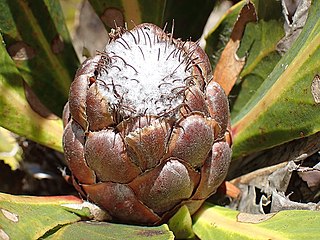
Protea vogtsiae, also known as the Kouga sugarbush, is a small flowering shrub of the genus Protea within the family Proteaceae, which is only found growing in the wild in the southern Cape Region of South Africa.

Protea pudens, also known as the bashful sugarbush, is a low-growing, groundcover-like, flowering shrub in the genus Protea. It is only found growing in the wild in a small area in the Western Cape province of South Africa.
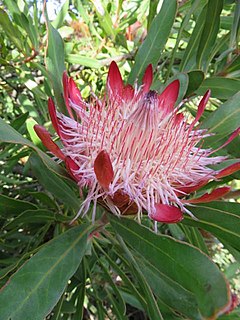
Protea susannae, also known as stink-leaf sugarbush, is a flower-bearing shrub of the genus Protea. The plant is endemic to the southwestern Cape Region of South Africa.

Protea speciosa, also known as the brown-beard sugarbush, is a flowering shrub which is classified as within the genus Protea.

Protea grandiceps, commonly known as rooisuikerbos, suikerbos or red sugarbush, is a flowering shrub that belongs to the Protea genus and is native to parts south western parts of South Africa. The shrub was listed as an+ near threatened species in 2006 according to the South African National Biodiversity Institute.
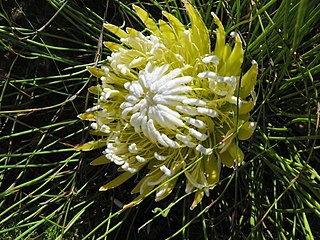
Protea lorea, also known as the thong-leaf sugarbush, is a flowering shrub belonging to the genus Protea.
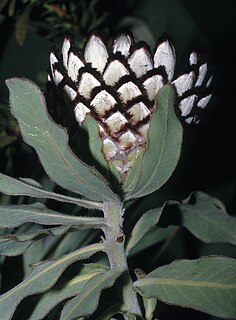
Protea holosericea, commonly known as the Sawedge Sugarbush, is a flowering shrub belonging to the Protea genus. The plant is endemic to South Africa and is found only on Sawedge Peak and Rabiesberg, two adjacent peaks in the Kwadousberg Mountains in the Western Cape.

Protea lorifolia, in English called the strap-leaved sugarbush, strap-leaved protea or strap-leaf sugarbush is a flowering shrub which belongs to the genus Protea.
Protea restionifolia, which is also known as the Reed-leaf sugarbush, is a flowering shrub endemic to the Western Cape province of South Africa where it is found from the upper part of the Breede River Valley through the Bot River Valley to Wolseley and the Koue Bokkeveld Mountains.

Protea scabra, also known as the sandpaper-leaf sugarbush, is a flowering groundcover that belongs to the genus Protea. The plant is endemic to South Africa and is found from the Hottentots Holland Mountains across the Riviersonderend Mountains, the Kleinrivier Mountains and around the town of Caledon to the Swartberg mountains.

Protea laevis, also known as the smooth-leaf sugarbush, is a flowering shrub that belongs within the genus Protea.
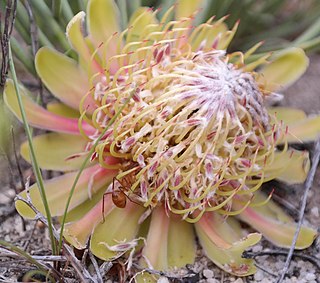
Protea revoluta, also known as the roll-leaved sugarbush or rolled-leaf sugarbush, is a species of plant which is classified in the genus Protea. P. revoluta is only found growing in the wild in South Africa, where plants can be found growing between the Cederberg inland on the Atlantic coast and the Witteberg area to the north.

Protea convexa, also known as large-leaf sugarbush, is a rare flowering shrub in the genus Protea of the family Proteaceae, which is endemic to the southwestern Cape Region of South Africa.

Protea scabriuscula, also known as the hoary sugarbush or gray sugarbush, is a flowering shrub, endemic to the southwestern Cape Region of South Africa.

Protea caespitosa, also known as hottentot bishop sugarbush or bishop sugarbush, is a flowering shrub belonging to the genus Protea which is only found growing in the wild in South Africa.

Protea punctata, also known as the water sugarbush or water white sugarbush, is a shrub belonging to the genus Protea which is found growing in the wild in South Africa.
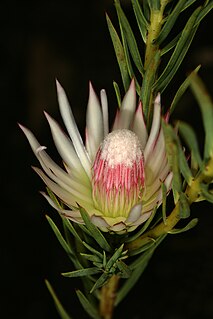
Protea mucronifolia, the dagger-leaf sugarbush, is a flower-bearing shrub belonging to the Protea genus. The plant is endemic to the Western Cape where it occurs from Hermon to Saron. This is the only population. The shrub grows upright and grows 1 m tall and flowers from October to January with the peak from November to December.
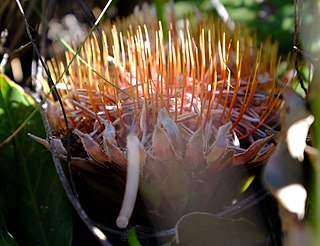
Protea scolopendriifolia, also known as the Harts-tongue-fern sugarbush or Hart's-tongue-fern sugarbush, is a flowering shrub endemic to South Africa, where it occurs in both the Western and Eastern Cape. It is found from the Cederberg, through the Kogelberg, Riviersonderend Mountains and Swartberg, to the Kouga Mountains. It blooms in Spring, from September to December.




















